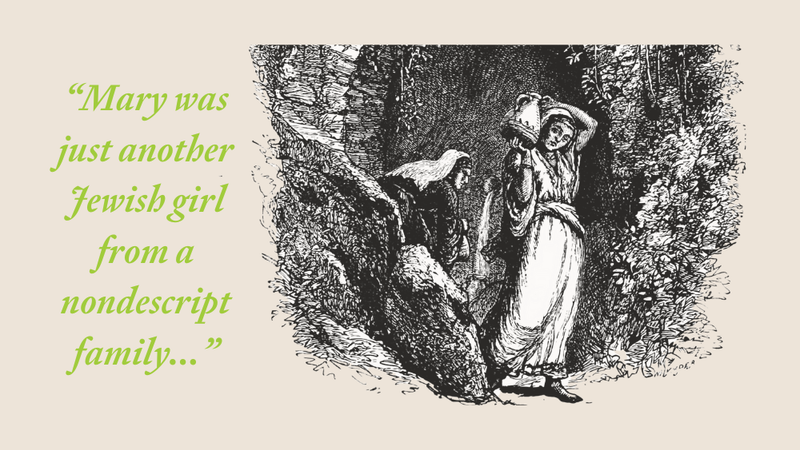I doubt there will be a sudden run on “What Would Mary Do?” bracelets after this essay is published, but I’m going to make the claim anyway: The Mother of our Lord is a wonderful yet far too often underappreciated model of discipleship among today’s heirs of the Reformation. In this brief essay, I don’t have space to survey the complex historical development of Marian theology or make the case for a reformational approach to honoring—yet not idolizing—Mary as the most biblically faithful path. Some traditions raise Mary dangerously high above the rank of a fellow disciple; others, in reaction, practically ignore her unique example in Scripture, which all faithful Christians should emulate. I want to focus much more narrowly on Luke’s account of the Annunciation, shedding light on three ways Mary is a particularly powerful example for every disciple of Jesus.
First, Mary is an example par excellence of a nobody who is made somebody by God’s electing grace in Christ. She was not born a privileged daughter of Herod or Pilate. Though she was a descendant of David (Luke 3:31), a daughter of Abraham in the Messiah’s promised bloodline, there were many others who fit the bill just as well. In contrast with the regal adornment she wears in medieval art, Mary acknowledges in her inspired song, the Magnificat, that God has looked on her “humble estate,” not on her worldly dignity or righteousness (Luke 1:46–55). Mary was just another Jewish girl from a nondescript family eking out a meager existence under Roman oppression during a corrupt political regime.
And yet one day, out of nowhere, the angel Gabriel announces to her, “Greetings, you highly favored one! The Lord is with you. . . . Do not be afraid, Mary, for you have found favor with God” (Luke 1:28, 32). To call someone favored by God was a common Hebrew expression announcing God’s gracious disposition toward his covenant people. While some have claimed that being highly favored signals that Mary must be more worthy than the rest of us, Luke means the very opposite: Gabriel doesn’t announce Mary’s worthiness, but God’s free grace!
Later, when Mary visits her cousin Elizabeth, who is pregnant with John the Baptizer, the baby leaps in her womb and Elizabeth shouts, “Blessed are you among women, and blessed is the fruit of your womb!” While being “blessed” doesn’t mean Mary was sinless or contributed any merit for her own salvation or ours, neither does it mean she was merely “happy.” Being blessed by God isn’t just a subjective feeling; it’s an objective fact. Calvin comments,
She is justly called blessed on whom God bestowed the remarkable honor of bringing into the world his own Son, through whom she had been spiritually renewed. And to this very day, the blessedness brought to us by Christ cannot be the subject of our praise without reminding us at the same time of the distinguished honor which God was pleased to bestow on Mary, in making her the mother of his only-begotten Son.
For this reason, Calvin adds, Mary’s own words direct us to honor her as an example rather than adore her as a co-redeemer. “We cheerfully acknowledge her as our teacher, and obey her instructions and commands.” And what she teaches most powerfully is that God alone saves through faith in her Son: “My soul magnifies the Lord, and my spirit rejoices in God my Savior” (Luke 1:46–47).
It is because of her Son that Mary is blessed. “God my Savior” is her child, gestating in her womb, made flesh from Mary’s genes and nourishment. In this sense, Mary is different from all other followers of Christ. “From now on all generations will call me blessed.” And Elizabeth confirms this by her greeting, “Who am I that the mother of my Lord should visit me?” Not exactly the usual welcome Mary experienced from a relative. Her special place in the history of salvation is not in question. However, she places herself on the side of the rest of us as recipients of God’s gift in Christ.
Second, Mary shows us that an honest disciple wrestles with hard questions in faith, trusting God for answers, provision, and guidance (vv. 34–37). It was not in judgment but in grace that God sent his heavenly ambassador with good news. Yet Mary responds to Gabriel with alarm and confusion. Luke writes, “But she was greatly troubled at the saying, and tried to discern what sort of greeting this might be.” She hadn’t been waiting for this message, thinking to herself, “Finally, after all my devotion, God has taken notice!” No, Mary is surprised—even troubled—by this announcement. A true disciple never entirely fails to be surprised by grace. Whenever we return to God’s promises, we should be amazed all over again at God’s goodness despite our unworthiness.
None of us, however, has experienced an announcement of God’s grace quite so astonishing as Gabriel’s to Mary:
“Behold, you will conceive in your womb and bear a son, and you shall call his name Jesus. He will be great and will be called the Son of the Most High. And the Lord God will give to him the throne of his father David, and he will reign over the house of Jacob forever, and of his kingdom there will be no end.” (vv. 31–33)
Gabriel brings the ultimate good news: Not only is the promised Messiah coming someday, but he’s coming now; not only will he be born of a woman, but he’ll be born of this woman. This is beyond comprehension. A few months earlier, Zechariah had asked Gabriel “how” in response to the announcement of his wife’s pregnancy. He was struck mute until John’s birth; Mary asks a similar question but receives no rebuke. “How will this be,” she asks, “since I am a virgin?” (v. 34). While the miracle of the virgin birth is of an entirely different order from the miracle of overcoming barrenness, that doesn’t seem to be the point. The point is that Mary questioned God’s word in honest trust rather than cynical incredulity.
Because Mary asks a good question, she gets a good answer: The same Spirit who hovered over the lifeless oceans in creation to make them fruitful will “come upon you, and the power of the Most High will overshadow you.” Gabriel says her child’s birth will be an unparalleled miracle directly wrought by God himself. Yet he gives her more concrete confirmation to hold on to. He tells her to go to her cousin Elizabeth who “in her old age also conceived a son, and this is the sixth month with her who was called barren. For nothing will be impossible with God” (vv. 35–36).
The narrative of Zacharias and Elizabeth, and also of Mary, is a redrawing of the Elkanah and Hannah story of 1 Samuel 1:1–2:11. Like Sarah and Rebekah, Hannah was barren. The God who created the world ex nihilo likes to work wonders with nothing to work with but his word and Spirit. On the steps of the Tabernacle of God’s Presence, Hannah offered a desperate prayer: “O Lord of hosts, if you will indeed look on the affliction of your maidservant and remember me, and not forget your maidservant, but will give your maidservant a male child, then I will give him to the Lord all the days of his life, and no razor shall come upon his head” (v.11). She is praying for mercy that God would look on her affliction, not on her worthiness. Nine months later, she who was barren gave birth to Samuel, whose name means “Heard By God.” Upon presenting her son to Eli the priest, Hannah composed a song to the Lord:
“My heart rejoices in the Lord; my horn is exalted in the Lord. I smile at my enemies, because I rejoice in your salvation. . . . The Lord kills and makes alive; he brings down to the grave and brings up from the grave. The Lord makes poor and makes rich; he brings low and lifts up. He raises the poor from the dust and lifts the beggar from the ash heap, to set them among princes and make them inherit the throne of glory. . . . For by strength shall no man prevail. The enemies of the Lord shall be broken in pieces; from heaven he will thunder against them. The Lord will judge the ends of the earth. He will give strength to his king, and exalt the horn of his anointed.”
Like Hannah, Elizabeth is barren but receives a heavenly promise of a son and believes it. Also like Hannah, Mary is in no position to contribute to the fulfillment of this promise. This is sure evidence graciously given to confirm Gabriel’s words and to bolster Mary’s faith that God is powerful enough to keep his promises, no matter how surprising they may be or unlikely they may seem. Mary shows us that it’s not impertinent for us to seek understanding in faith, welcoming as much explanation and evidence as God will give us.
Third, Mary shows us that a disciple entrusts herself to God’s promises despite everything. Throughout biblical history, faithful disciples reply to God’s address, “Here I am.” It was a common idiom in court etiquette, the equivalent of “As you wish” or “I am at your disposal.” “Behold” in verse 38 is a Greek translation of this Hebrew idiom, “Here I am”: “And Mary said, ‘Behold, I am the servant of the Lord; let it be to me according to your word.’” This may strike us as a strange way of speaking: “Let it be to me according to your word.” But it underscores her acknowledgment that she was on the receiving end of God’s word and work. This promise from God gave her courage to walk the path he laid out for her.
For Mary, she had to think that this path would mean likely rejection by her fiancé and would leave a lifelong stain on her reputation. Yet Mary clung to the promise even when her own heart was pierced at her son’s crucifixion. All of us feel the tension as our lives don’t play out the way we might have liked them to, or we face suffering of one kind or another. Being able to say with Mary and the rest of the faithful, “Thy will be done”—to trust that God is good and loves us, and that his plan is ultimately for our salvation—that’s how he gives us courage to move forward with whatever he ordains for each of us. Faith in God’s promises in Christ, despite everything, underlies every step we take in this life’s pilgrim journey. We must not be afraid, for we too have found favor with God.
Footnotes
John Calvin, “Commentary on Luke 1,” Commentary on the Gospel of Luke, Calvin’s Commentary on the Bible, 1:28–32, https://www.studylight.org/commentaries/eng/cal/luke-1.html.
BackCalvin, “Commentary on Luke 1,” 1:28–32.
Back







